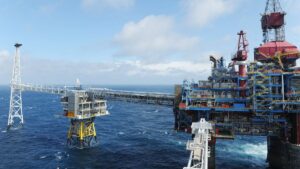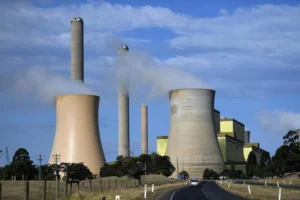Federal energy and emissions reduction minister Angus Taylor has issued a call to carbon market participants to come to the defence of the government’s troubled carbon offset scheme, but has again refused to help drive the market by imposing stronger emissions caps on major emitters.
Taylor said Australia’s carbon market participants needed to protect the “social licence” of the government’s carbon offset regime, and come to the defence of the Emissions Reduction Fund (ERF) after fresh concerns were raised about the scheme’s integrity, including that many credits were a “fraud” on the environment.
“We all have a role to play in safeguarding the ERF’s of social licence. What I can say to you today is the higher the standard you set as an industry, the more government can step back,” Taylor told a Carbon Farming industry forum hosted by the Carbon Market Institute on Friday,
This week, three of the largest beneficiaries of the Emissions Reduction Fund issued a seemingly coordinated defence of the scheme. However, smaller market participants have called for the government to urgently consult with the industry.
Taylor used Friday’s speech to reject concerns that have been raised by professor Andrew McIntosh, the previous chair of the Emissions Reduction Assurance Committee, about the integrity of the Australian Carbon Credit Units (ACCUs) that the government has issued under the Emissions Reduction Fund.
McIntosh, who oversaw the design of Australia’s carbon offset methodologies, has claimed the bulk of the ACCUs issued by the government are not backed by genuine reductions in emissions.
Taylor dismissed the concerns by saying the bodies responsible for administering the offsets scheme had concluded there was no issue.
“When industries come under political attack, they have a responsibility to stand up, not for themselves, but for the facts,” Taylor said
“And the fact is, the Clean Energy Regulator and the Emissions Reduction Assurance Committee looked into the first round of claims made by Andrew McIntosh, the Australia Institute, and other groups like the Australian Conservation Foundation, late last year.”
“Both independent organisations found those claims were not supported by the evidence,” Taylor added.
Taylor went on to claim that the Australian Conservation Foundation had since “backed away” from the criticisms.
But in response, ACF’s chief executive officer Kelly O’Shanassy said Taylor’s assertion was false, saying the group stood by the concerns it had raised about the scheme’s integrity.
“Today, the Australian Conservation Foundation reaffirms its concerns about significant flaws in Australia’s carbon offsets scheme and calls for an independent review of the scheme. We share Professor Andrew Macintosh’s concerns,” O’Shanassy said.
“Any speech given by the Energy Minister that claims otherwise is incorrect. It’s time for an independent review of Australia’s carbon credit scheme.”
Taylor made clear that while he expected the carbon market to come to the defence of the Coalition’s offset scheme, he offered little by way of new commitments to strengthen demand for carbon offset projects.
Awkwardly, Taylor told the carbon farming summit that he would not seek to “ratchet down” the emissions caps imposed on industrial emitters under the Safeguard Mechanism, despite the fact that carbon farmers would benefit from an increased demand for offsets that would be generated if the caps were tightened.
“We’ve set out our plan and our policies, and the Emissions Reduction Fund will continue to be a very important part of that. We’ll continue to resist calls to ratchet down the Safeguard Mechanism. Make no mistake. This is a carbon tax by another name,” Taylor said.
The Safeguard Mechanism was designed and implemented by the Abbott Government, as an alternative policy following the repeal of the carbon price mechanism. However, the emissions limits imposed under the Safeguard Mechanism have been soft and imposed only negligible requirements for emissions to be offset.
Federal Labor has committed to adapting the Coalition’s Safeguard Mechanism, imposing stricter emissions caps in an effort to drive down Australia’s industrial emissions and boost demand for emissions reduction projects.
In his own address to the Carbon Farming Industry Forum, Labor climate and energy spokesperson Chris Bowen said that Labor remained committed to reviewing the design of the Emissions Reduction Fund should it form a government after the next election.
“We will review the ACCU framework, a short and sharp review. But an important one,” Bowen told the forum.
“Growing private demand for ACCUs, both voluntary and under an improved Safeguard Mechanism, represents a big change. So I want to make sure that the ACCU framework is fit for purpose for that change.”
“I have to say the allegations aired this week were concerning. But it’s not to say that I accept them at face value. It is to say they warrant further scrutiny.”
“Last December, long before these allegations, Labor committed that our review of the ACCU framework would also consider integrity, and I think that’s important.”










